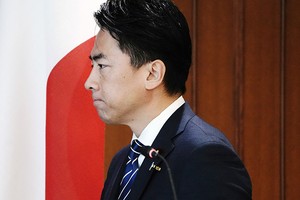By KAZUSHIGE KOBAYASHI/ Staff Writer
April 7, 2023 at 18:22 JST
Tamaki Koizumi’s older brother, Takeshi, relayed the news in a tense voice in early spring five years ago. Their mother had collapsed at her home in Joetsu, Niigata Prefecture.
In those days, Takeshi would stay at his mother’s home on weekdays because she would have been all alone otherwise. On weekends, he returned to Saitama Prefecture where his own family lived.
He was four years older than Tamaki, now 59, who was living in Neyagawa, Osaka Prefecture, at the time.
The siblings’ father had died 18 years earlier.
Their mother collapsed because she needed an operation to replace three heart valves with artificial ones.
The operation started at 9 a.m., and Tamaki and her brother waited for the surgery to end at the hospital.
Tamaki said to Takeshi, “If … in case…,” hinting at the possibility that their mother could die.
Takeshi looked both sad and annoyed.
“Don’t think about such a thing,” he told her. “What if it becomes a reality?”
Time passed silently, and their mother returned from the operation room 10 hours later.
It was very sunny the following day, so Tamaki and Takeshi went to Takada Joshi Park near the hospital together.
Under the cherry blossoms in full bloom, Takeshi ate dried squid tempura and gulped down beer, laughing loudly.
He was his usual talkative and cheerful self.
The two had fun as if they were children again.

And their mother has since made a full recovery. She is even able to work on her farm every day.
Takeshi now appears in a photograph at a “butsudan” Buddhist altar in his mother’s home, displayed next to a picture of his smiling father.
Takeshi appears both jovial and serious in the photo, with the edges of his mouth slightly moving upward.
He died of liver disease in summer 2020.
His body, which was stout thanks to his childhood judo training, became thin and weak. The sound of his footsteps when he climbed stairs was not strong anymore.
When Tamaki asked her brother why he was losing weight, he only said: “It’s nothing serious. I’m all right.”
He never told her he was suffering from cancer.
After he was admitted to a hospital, he said his entire body ached.
When Tamaki asked which part hurt the most, he just said, “here,” indicating his back.
When she massaged his back, his expression softened.
After a month in the hospital, Takeshi died.
Following his death, Tamaki started visiting her mother once a month. She still lives alone in Niigata.
Whenever she visits her mother, Tamaki feels the absence of her brother, who was generous and used to buy her nice food.
Tamaki returned to Takada Joshi Park this spring.
The cherry blossoms there brought back memories of her brother, and she wished she could talk to her brother again who was happy and smiling that day.





















A peek through the music industry’s curtain at the producers who harnessed social media to help their idols go global.
A series based on diplomatic documents declassified by Japan’s Foreign Ministry
Here is a collection of first-hand accounts by “hibakusha” atomic bomb survivors.
Cooking experts, chefs and others involved in the field of food introduce their special recipes intertwined with their paths in life.
A series about Japanese-Americans and their memories of World War II